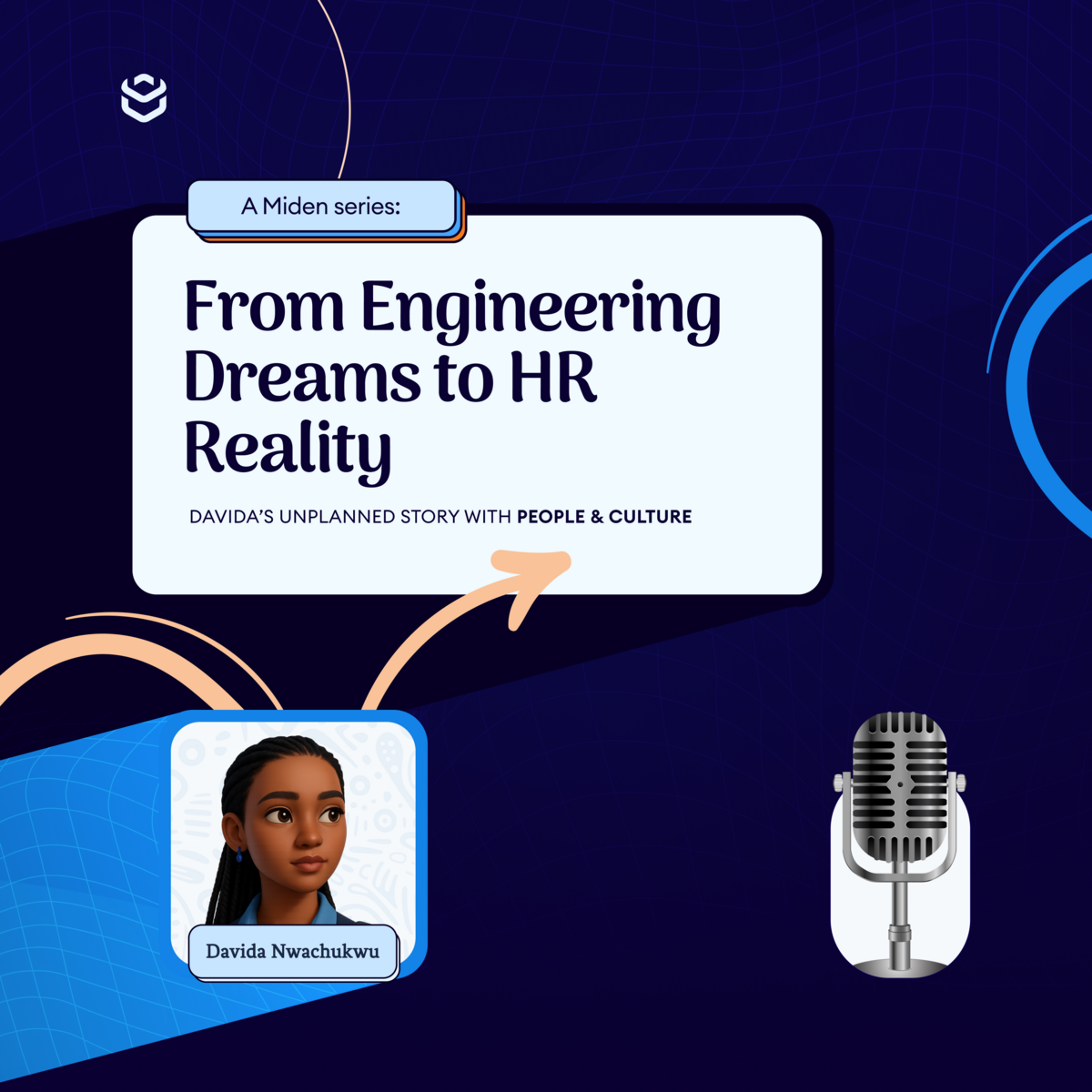In a world where HRs are often stereotyped as 'the Wicked Wizard of Oz’, we decided to get behind the curtains with Davida Nwachukwu, the People & Culture Lead at Miden, to uncover the real story.
Join us as she shares her accidental, yet deeply intended, journey into the world of Human Resources.
“I never planned to work in HR.”
Five years ago, HR was not on Davida’s radar.
While navigating through the boundaries of atoms, nuclear technology, photonics, and the like, she accidentally stumbled upon an administrative role.
"I majored in Industrial Physics. I never imagined I’d end up in People & Culture. But now, I see it as a unique opportunity to design strategies and systems that help people enjoy their work and empower businesses to make the most of their talent. The fact that I get to build, design, and strategize in ways that directly impact people’s experience at work—that’s what truly makes me happy."
It was this realization that flipped the switch for Davida.
Problem-solving and empathy became Davida’s superpowers in navigating human dynamics within the organization.
What does your day look like as People and Culture Lead at Miden?
No two days are the same, according to Davida.
In her words, HR requires a mix of structure and flexibility. Some days are filled with team strategy, while others focus on fixing real human issues, such as onboarding, health insurance, or staff concerns.
“Sometimes I am responding to welfare issues while in transit because some things just cannot wait. You have to be flexible, responsive, and willing to adjust quickly when people need you.”
It is unpredictable, but that is what makes the work meaningful.
How do you balance being the HR lead and being yourself?
When asked how she manages the balance between being “HR Davida” and 'just Davida', she said;
‘Over the years, I’ve learned not to separate both roles but to integrate them. I believe one of the greatest strengths of the 21st-century professional is learning how to break down that wall between ‘work mode’ and ‘life mode’—because life is no longer confined to the office.’
That’s very interesting, and I do agree. The interviewer commented. Merging both roles can be a smart move, but don’t you think there’ll be a conflict, especially when you’re dealing with other personnel in the company?
“I set boundaries. I’ll leave prompts, communicate when I’m unavailable, and structure my time.”
What happens when a conflict challenges your values?
“Organizational psychology is not an option in the HR department. There’s no one-size-fits-all blueprint because every person requires a tailored approach."
It depends on the person’s nature. For;
- Phlegmatic personality, i.e., someone calm, not easily angered, but quietly firm.
I’d approach the situation through a trusted colleague whom they respect, facilitating a more receptive conversation. Phlegmatics aren’t power-driven, so leveraging relational influence works better than confrontation.
- Choleric personality, i.e., someone power-conscious, assertive, and quick-tempered.
I’d avoid immediate face-to-face confrontations to reduce the chance of an emotional outburst. Instead, I’d record a short, respectful video message where I present clear points, options, and the implications of their decisions.
- It’s all about managing the power dynamics carefully.
“Every interaction must be intentional, not just with what I’m saying, but how I’m saying it, based on who I’m speaking to.”
What do people misunderstand about HR?
She chucked with a familiar thought.
“Sometimes, I understand why people misunderstand HR. Let’s be honest, some of these perceptions come from real encounters with HR professionals who’ve embodied that ‘strict monitor’ attitude. So, people end up thinking HR is just about hiring, firing, and policing, going around checking who came late and who didn’t.”
But that’s not what HR stands for.
We often view HR as the ‘wicked stepmother’ of the organization – always frowning, uptight, bossy, making demands without understanding the realities on the ground. But People Operations is far from that.
‘I like that analogy, ’ the interviewer remarked.
“Our job is to build systems that bring out the best in them so that both the people and the business can thrive. HR isn’t about firing or playing office police; it’s about enabling people to do their best work in an environment that supports them.”
What does a healthy workplace culture look like to you?
“A healthy culture is one where people are allowed to be themselves. The company supports their growth and well-being while helping them succeed at their work.”
She believes companies that focus on control often miss the bigger picture.
I find it strange that some companies still track every move their employees make. That does not create trust or motivation.
What do you love most about working at Miden?
“What I love most is that Miden does what it says. The pace is fast, but the support is real. The company helps you grow into the pace instead of expecting you to adjust overnight. It gives you the tools and shows you the value in the process. You are not forced into the culture. You are welcomed into it.”
The interviewer nodded and smiled. “I can agree with that. Working at Miden has been one of the best parts of my career.”
If you were not in HR, what would you be doing?
“If I were not in People and Culture, I would probably choose between law and economics.”
“Thank you for sharing all of this, Davida. It has been a great conversation.”
Final Thoughts
If you think HR is just about forms and compliance, you’re missing the plot.
It’s about people. It’s about building systems that understand humans aren’t machines, but messy, brilliant, complex beings who need the right environment to thrive.
Davida’s story is a reminder that HR isn’t just a side function. It’s the heartbeat of any thriving company.
Want to be a part of the journey? Miden isn’t just building products. We’re building a culture, one human-centered blueprint at a time.
We are a financial operating system for businesses across nations. Let’s talk about how to simplify and scale your payment infrastructure.





